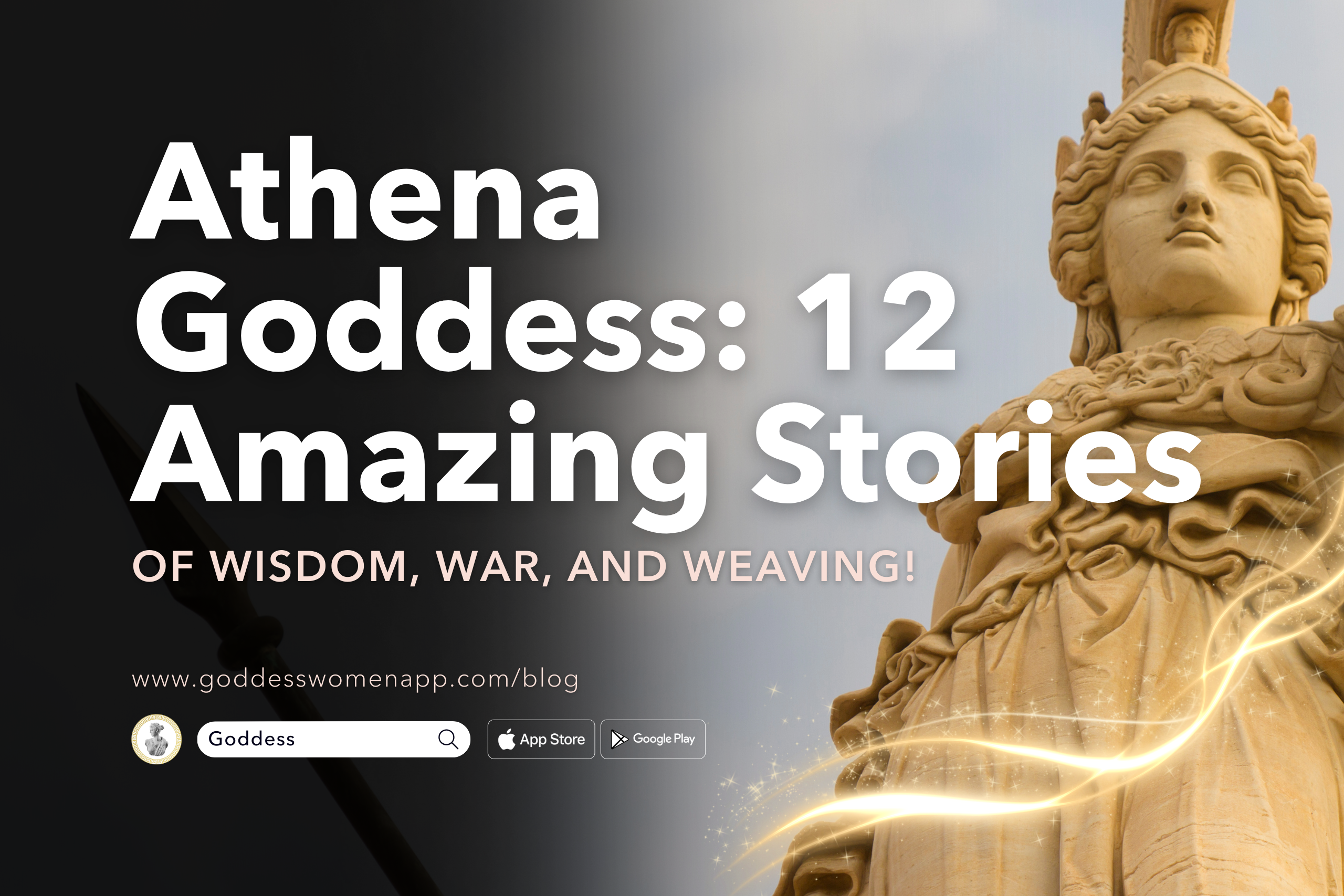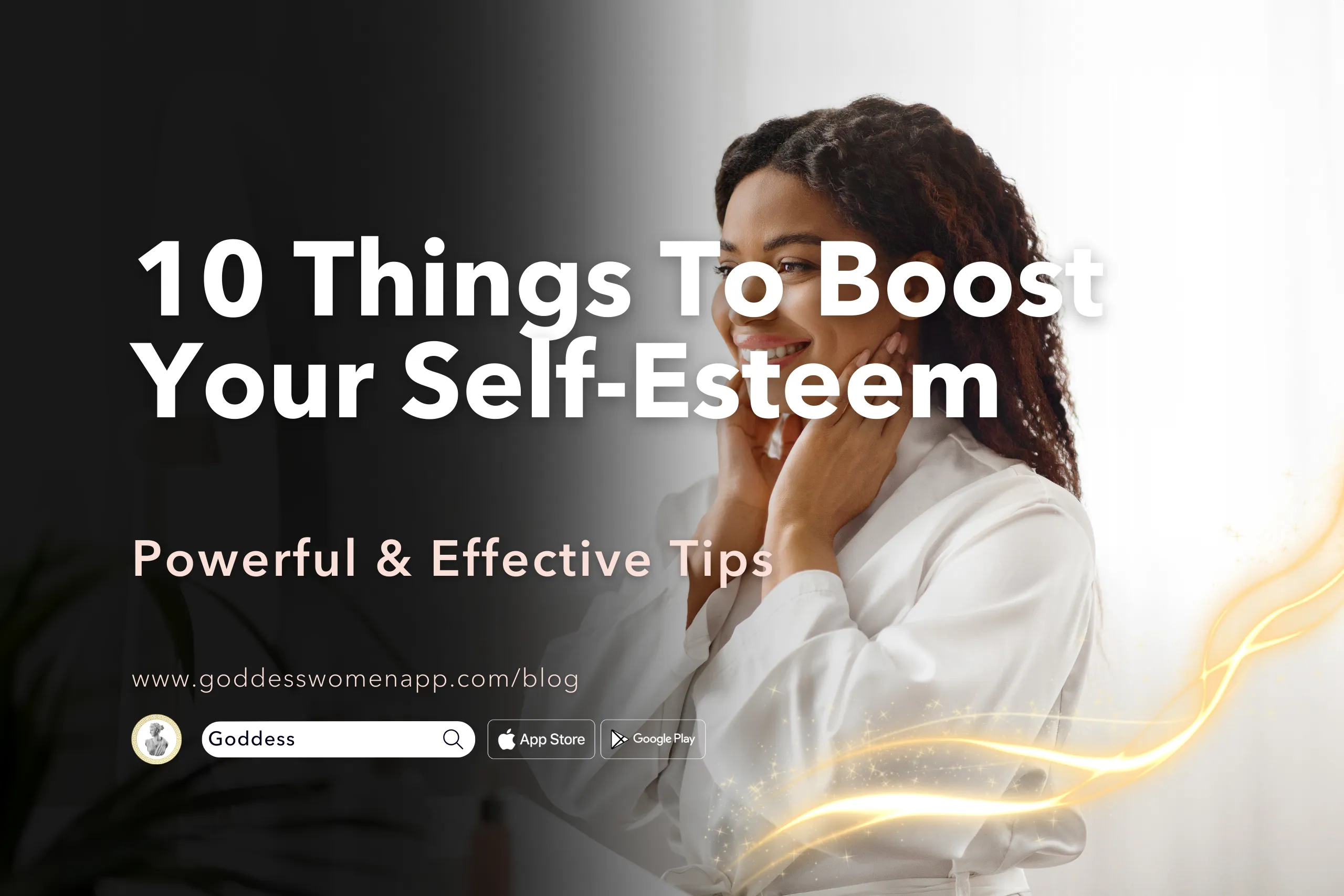Table of Contents
Introduction
Hey, mythology buffs and curious minds! Ever wondered why Athena, the goddess of wisdom, war, and weaving, is such a big deal in Greek mythology? Well, buckle up, because we’re about to take you on a whirlwind journey through “Athena Goddess: 12 Amazing Stories of Wisdom, War, and Weaving!”
From her jaw-dropping entrance into the world (literally!) to her incredible inventions, Athena is not your average deity. She’s a warrior, a strategist, and a patron of the arts all rolled into one. Whether you’re a die-hard fan of mythology or just love a good story, these tales of Athena will leave you in awe of her wisdom, bravery, and crafty skills. Let’s dive into the epic world of gods and goddesses, starting with the most headstrong birth story you’ll ever hear! Now download Goddess app to take the archetype test for free.

The Birth of Athena Goddess: A Headstrong Beginning
Picture this: Zeus, the king of the gods, has a splitting headache. And no, we’re not talking about the kind you get from listening to the celestial choir on full blast. This was a headache of divine proportions. So, what’s a god to do? He does what any reasonable deity would—calls for Hephaestus, the god of blacksmiths and craftsmen, to wield his axe and crack open his skull.
Out pops Athena, fully grown and clad in armor, shouting a battle cry that echoes through the heavens and earth. Talk about making an entrance! This isn’t just any birth; it’s a declaration of Athena’s power and independence. Born from the head of Zeus, Athena symbolizes pure intellect and strategic warfare, untainted by the messiness of mortal birth.
Why does this matter? Athena’s origin story sets the stage for her role as the goddess of wisdom and strategic war. Unlike other gods and goddesses born in the usual ways, Athena’s unique birth from Zeus’s head immediately establishes her as a deity of intellect and thought—attributes that define her interactions with the world of gods and mortals alike.
From day one (literally), Athena was ready to take on the world with her wisdom, courage, and a sprinkle of divine warfare. And let’s not forget her skills in weaving, which are legendary in their own right. But that’s a tale for another section.
So, why should you care about the headstrong beginning of Athena? Because it’s the perfect snapshot of her character: fiercely independent, incredibly wise, and always ready for battle. Stay tuned as we unravel more tales that showcase the extraordinary life and legacy of Athena, the goddess who’s so much more than just Zeus’s daughter.

Athena and the City of Athens: Patron Goddess
The story of how Athens chose its patron deity is not just a tale of a competition between gods but a narrative rich with symbolism and the embodiment of the Athenian identity itself. When Athena and Poseidon vied for the honor, it was more than just a divine contest; it was a pivotal moment that defined the future of an entire civilization.
Poseidon, with his mighty trident, offered the people a well of seawater, symbolizing naval power and the strength of the seas. While this gift had its appeal, reflecting the might and unpredictability of the gods, it was Athena’s offering that truly captured the essence of sustainable growth and peace. The olive tree, with its fruits, oil, and wood, was a gift of endless resources, symbolizing peace, prosperity, and the resilience of life.
This decision by the people of Athens wasn’t merely practical; it was a profound statement of their values and vision. Athena’s wisdom in offering the olive tree spoke to the Athenians’ aspirations for a civilization that would last through the ages, thriving on wisdom, peace, and the arts, rather than on conquest and power alone.
In celebrating Athena’s victory, the people of Athens didn’t just choose a goddess; they chose a path that would define their city’s legacy—a legacy of democracy, philosophy, and the arts, pillars that still stand in the foundations of Western civilization today.

The Weaving Contest: Athena vs. Arachne
The tale of Athena and Arachne goes beyond a mere mythological contest; it’s a narrative steeped in themes of creativity, pride, and transformation. Arachne, a mortal of unparalleled skill in weaving, dared to challenge the divine Athena. This was not just a challenge of skill but a fundamental questioning of divine authority and the place of mortals in relation to the gods.
Athena’s acceptance of this challenge reveals her character’s complexity. As the goddess of wisdom and crafts, she champions excellence and hard work, yet she also stands for the respect due to the gods. The contest itself was a dazzling display of talent and artistry. Athena’s tapestry, weaving the majesty and authority of the gods, against Arachne’s tapestry, showcasing the gods’ misdeeds, presents a stark contrast in perspectives—divine vs. mortal.
Arachne’s punishment, turned into a spider for her hubris, serves as a poignant reminder of the delicate balance between pride and humility. Yet, in her transformation, Arachne retains her weaving abilities, a testament to her unmatched skill—a skill so profound that it warranted acknowledgment even in punishment. This metamorphosis speaks to the idea that talents and skills, even when misapplied, are intrinsic parts of our identity, echoing through our actions and legacies.
Athena’s actions post-contest also reflect a deep sense of justice and perhaps, a hint of compassion. By allowing Arachne to continue weaving, she acknowledges the mortal’s talent while enforcing the cosmic order and the respect it demands. This story, rich in symbolism, invites reflection on the nature of creativity, the consequences of pride, and the immortal influence of our stories and creations.

Goddess Athena and her Role in the Trojan War: Strategy and Support
In the annals of Greek mythology, the Trojan War stands as a testament to the complex interplay of divine and mortal affairs. Amidst this legendary conflict, Athena, the goddess of wisdom and strategic warfare, emerged as a key figure, aligning her considerable intellect and military prowess in support of the Greek heroes.
Athena’s involvement in the war was multifaceted, embodying her role as the patron goddess of heroic endeavor. She was not driven by mere blood lust but by a profound sense of justice and strategic acumen. From the moment Paris awarded the golden apple to Aphrodite, sealing Troy’s fate, Athena sided with the Greeks, guided by her wisdom and a keen sense of the strategic landscape.
Throughout the conflict, Athena’s guidance was crucial. She protected and inspired key figures such as Odysseus and Achilles, offering them not only her divine protection but also tactical advice that proved indispensable on the battlefield. In the Iliad, Homer vividly describes Athena donning her gleaming aegis and plunging into battle, tipping the scales in favor of the Greeks through her divine form and strategic insights.
Moreover, Athena’s role extended beyond the battlefield. She was a guiding force for Greek heroes, embodying the intellectual and civilized side of warfare, contrasted with the brute force represented by Ares, the god of war. Her involvement in the Trojan War illustrates not only her military superiority but also the strategic prowess that characterizes Athena’s domain.
The Aegis: Athena’s Mighty Shield in Greek Mythology
Central to Athena’s iconography and her abilities in war is the Aegis, a powerful emblem of protection and strength. Far more than a mere shield, the Aegis represents Athena’s protective nature and her strategic approach to warfare. This divine artifact, often depicted as a cloak or shield emblazoned with the head of the Gorgon Medusa, was capable of instilling terror in the hearts of those who faced it.
The Aegis’s origins are rooted in the rich tapestry of Greek mythology. According to early myths, Zeus himself once wielded the Aegis before passing it to his daughter, Athena, marking her as his favorite child and underscoring her status as the warrior goddess and goddess of wisdom. The shield’s association with the Gorgon Medusa, whom Athena helped Perseus defeat, adds a layer of complexity to its symbolism, intertwining themes of protection, wisdom, and the power over life and death.
In battle, the Aegis served as a manifestation of Athena’s divine power, capable of unleashing thunderbolts and spreading chaos among her enemies. Its presence on the battlefield was a reminder of Athena’s protective gaze over her favored warriors and her strategic mastery. The Aegis not only symbolized Athena’s role as the guardian of heroes but also her overarching dominion over the intellectual and strategic aspects of war.
The enduring legacy of Athena, encapsulated in her strategic support during the Trojan War and the symbolic power of the Aegis, continues to resonate through history. As the patron goddess of wisdom, strategic warfare, and the protector of Greek cities, Athena’s influence extends far beyond the ancient tales of Mount Olympus and the Trojan acropolis. Her stories inspire a reverence for wisdom, strategy, and the virtues of intellectual and military prowess, underscoring the multifaceted nature of this preeminent figure in Greek mythology.

Athena and Medusa: The Story Behind the Gorgoneion
In the pantheon of Greek mythology, the tale of Athena and Medusa presents a complex tableau of divine interaction and mortal fate. Medusa, once a beautiful woman, became one of the most iconic figures of ancient Greece, known for her hair of serpents and gaze that turned onlookers to stone. The transformation of Medusa is intrinsically linked to Athena, the goddess of wisdom and strategic warfare.
According to early myths, Medusa was transformed into a monstrous Gorgon as a result of Athena’s wrath. However, beyond the surface of this tale lies a narrative of divine protection, strategic acumen, and the nuances of ancient beliefs. The Gorgoneion, the image of Medusa’s head, became an emblem associated with Athena, adorning her shield and temple, the Parthenon, serving as a symbol of protection and the goddess’s strategic prowess.
This story, while showcasing Athena’s formidable aspects as the warrior goddess and patron goddess of Greek cities, also reflects her role in the broader contexts of wisdom, sexual modesty, and the complexities of divine and mortal interactions in ancient Greece. Athena, in her divine form and wisdom, navigates the realms of justice and protection, utilizing the Gorgoneion as a strategic tool in warfare and as a guardian emblem, cementing her legacy as a preeminent figure among the Olympian gods.

Mentorship of Greek Heroes: Guiding Hands of Wisdom
Athena’s influence extends far beyond the battlefield and the divine realms of Mount Olympus; her mentorship of Greek heroes stands as a testament to her guiding wisdom and strategic acumen. Athena, the goddess of wisdom, took a keen interest in the affairs of heroic figures, guiding them through trials with her sage advice and divine interventions.
From the cunning Odysseus, whose reliance on Athena’s guidance throughout Homer’s Odyssey highlights her role as the patron goddess of heroic endeavor and intellectual strategy, to the mighty Hercules, whom Athena aided in his labors, Athena’s mentorship was pivotal. Her guidance was not limited to sheer military prowess but encompassed the intellectual and civilized side of heroism, emphasizing strategy, justice, and moral wisdom.
Athena’s role as mentor and protector of heroes like Perseus, to whom she provided crucial assistance in defeating the Gorgon Medusa, underscores her multifaceted nature. She embodies not just the warrior aspect but also the nurturing of wisdom and skill among the favored heroes of Greek mythology. Her strategic acumen, combined with a profound sense of justice, allowed these heroes to navigate their quests and achieve their destinies.
The enduring legacy of Athena, through her strategic wisdom, divine mentorship, and the symbolic power of the Gorgoneion, continues to resonate, illustrating the depth of her domain and her impact on the heroes and stories of ancient Greece. As the goddess Athena guided these legendary figures with a steady hand of wisdom, her stories remind us of the enduring power of intellect, strategy, and moral guidance in the face of life’s battles.
The Olive Tree: Symbol of Peace and Prosperity
In the heart of ancient Greece, the olive tree stands as a testament to Athena’s wisdom and her deep connection to the city of Athens. According to myth, during the contest with Poseidon for the patronage of the city, Athena, the goddess of wisdom and strategic warfare, bestowed the olive tree upon the Athenians. This gift was not merely an agricultural boon but a profound symbol of peace, prosperity, and the enduring legacy of Athena’s wisdom.
The olive tree, with its hardy nature and the richness of its oil, became a cornerstone of Athenian economy and culture. It symbolized Athena’s virtues: peace, as opposed to the destructive force of Poseidon’s salt spring; prosperity, through the myriad uses of olive oil in daily life, from food to lamp fuel; and wisdom, in the sustainable and thoughtful gift that continued to benefit Athens for generations.
Moreover, the olive tree became synonymous with Athena, further cementing her status as the patron goddess of the city. The Parthenon, a temple dedicated to Athena Parthenos (Athena the Virgin), prominently featured the olive tree, not just as an agricultural product but as a divine symbol of the goddess’s protection and benevolence toward Athens. This enduring symbol of Athena’s patronage highlights her role as a deity deeply intertwined with the identity and prosperity of one of the greatest cities of ancient Greece.

Athena’s Inventions: The Flute, the Ship, and More
Athena’s wisdom and strategic prowess extended beyond the battlefield and divine contests; she was also a patroness of invention and craft. Greek mythology credits Athena with the invention of several items crucial to Greek society, reflecting her intellectual and civilized side, as well as her desire to aid humanity.
The Flute: Athena is said to have invented the flute, inspired by the sighing winds through the reeds. However, after seeing her reflection distorted while playing it, she discarded the instrument, deeming it unfit for a goddess. The flute, though, was picked up by mortals and became a significant part of Greek music and culture, showcasing Athena’s influence on the arts and her embodiment of wisdom even in her rejections.
The Ship: Athena also contributed to the advancement of navigation and trade by inventing the ship. This invention revolutionized travel and commerce in the ancient world, reflecting Athena’s strategic acumen and her role in promoting exploration, connectivity, and economic development among the Greek cities and beyond.
The Plough and the Yoke: Athena’s ingenuity also touched agriculture, with the invention of the plough and the yoke, tools that transformed farming practices. These inventions enabled more efficient cultivation of the land, bolstering food production and stability, further exemplifying Athena’s wisdom in fostering prosperity and societal advancement.
These inventions, alongside the olive tree, underscore Athena’s multifaceted nature as a goddess of wisdom, warfare, and patronage of crafts and innovation. Her contributions to Greek society through these inventions highlight her role in shaping the intellectual, economic, and cultural landscape of ancient Greece.

The Pantheon: Athena’s Enduring Legacy
Within the illustrious ranks of the Olympian gods, Athena, the goddess of wisdom and strategic warfare, stands as a testament to the ancient Greeks’ reverence for intellect, strategy, and the protective qualities of the divine. Born from Zeus’s head, fully armed and ready for battle, Athena’s unique origin story underscores her direct connection to Zeus, the chief god, and signifies her inherent wisdom and martial prowess.
Athena’s wisdom was unparalleled, her strategic acumen vital in both the realm of gods and the affairs of mortals. From the Trojan War, where she guided Greek heroes to glory, to the contest with Poseidon over the patronage of Athens, her intelligence and tactical insight were always in service of justice and the greater good. As Pallas Athena, she was venerated as a warrior goddess who protected the city-states, especially Athens, where the Parthenon stood as a magnificent temple dedicated to her divine form, Athena Parthenos.
Her attributes, the olive tree symbolizing peace and prosperity, and the Gorgoneion on her shield, representing protection and the power to ward off evil, were emblematic of her diverse domains. These symbols not only conveyed her protective nature but also her role in fostering the intellectual and cultural growth that characterized ancient Greece.
Athena’s inventions—the ship, the plough, and even the concept of the jury system—demonstrate her influence over the development of civilization, guiding humanity towards advancements that shaped societal structures and cultural norms. Her patronage extended beyond the battlegrounds and the polis; as Athena Polias, she was the guardian of the household, and as Athena Ergane, she championed crafts and artisans, highlighting her connection to everyday life and the practical needs of her people.
Moreover, Athena’s legacy transcends the confines of Greek mythology. As Minerva, her Roman counterpart, she continued to embody wisdom, strategic warfare, and the arts. The enduring fascination with Athena across cultures and epochs speaks to the universal appeal of her qualities: wisdom, courage, and the pursuit of justice.
In art and literature, from the Homeric hymns of ancient times to the works of classical and modern writers, Athena’s presence is a constant source of inspiration. Her depictions on silver coins of Athens, in the epic tales of Homer’s Odyssey, and in the statues and temples that honor her, all contribute to a legacy that endures well beyond the ancient world.
Athena’s place in the pantheon of Olympian gods is not just as a deity of wisdom and war but as a symbol of the intellectual and civilized side of humanity. Her legacy, imbued with the qualities of strategic prowess, military superiority, and benevolent guidance, continues to inspire and influence, reflecting the enduring power and complexity of this beloved goddess.
Athena in Modern Culture: From Literature to Film
The goddess Athena, with her gleaming eyes and storied past, has transcended the confines of ancient Greek mythology to become a figure of fascination and reverence in contemporary culture. Her depiction in literature varies from the wise and guiding force in Homer’s Odyssey to a figure of intellectual and moral complexity in modern novels and poetry, showcasing her enduring legacy as a symbol of wisdom, strategic warfare, and the protector of heroes and cities.
In film and television, Athena’s persona is often woven into characters that embody her courage, strategic mind, and war prowess, whether they are explicitly named after the goddess or inspired by her attributes. Her influence is palpable in strong female leads who balance fierce warrior skills with profound wisdom, reflecting Athena’s role as the warrior goddess and the goddess of wisdom. Furthermore, Athena’s mythological narratives and symbols—the olive tree, the owl, and the Gorgoneion—enrich visual storytelling, adding layers of meaning that resonate with audiences seeking depth and historical connection.
Athena’s presence in modern media extends to video games and graphic novels, where her character inspires storylines that blend ancient mythology with contemporary themes, appealing to a generation that values both the fantastical elements of her mythology and the relatable qualities of wisdom, justice, and strength in adversity.

Embodying Athena: Wisdom, Courage, and Creativity in Everyday Life
The principles associated with Athena—wisdom, courage, and creativity—are not just lofty ideals but practical qualities that individuals can aspire to and embody in their daily lives. Athena’s wisdom, more than mere knowledge, represents a balanced understanding of life, encouraging thoughtful decision-making, empathy, and a pursuit of learning that enriches both the individual and their community.
Courage, a virtue exemplified by Athena in her role as the patron goddess of heroic endeavor, transcends physical bravery to include the courage to stand by one’s convictions, to face challenges head-on, and to advocate for justice and fairness in all aspects of life.
Creativity, inspired by Athena’s patronage of arts and crafts, encourages innovation and the exploration of new ideas. It’s a call to embrace one’s talents, whether in the arts, sciences, or everyday problem-solving, fostering a world that values and progresses through creative thought and action.
To embody Athena means to live with purpose, to cultivate an intellectual and civilized approach to life’s challenges, and to inspire others through actions that reflect integrity, strength, and a commitment to personal growth and societal well-being.
Conclusion
As we conclude our journey through the stories of Athena, the goddess of wisdom, strategic warfare, and the patron of heroes, we find ourselves reflecting on the myriad ways in which her legacy continues to shape our understanding of courage, intelligence, and creativity. From the ancient ruins of Athens, where temples like the Parthenon still stand as a testament to her enduring legacy, to the pages of modern literature and the screens of cinemas worldwide, Athena remains a beacon of strength, wisdom, and inspiration.
Her tales, rich with the history of ancient Greece and the timeless struggles and triumphs of its heroes, remind us of the complexity and depth of human endeavor. Athena, with her gleaming eyes, embodies the pinnacle of what it means to be guided by both intellect and integrity. Through her strategic prowess in the Trojan War, her nurturing of Greek heroes, and her inventive gifts to humanity, Athena teaches us the value of balancing strength with wisdom, and power with compassion.
The olive tree, her gift to the city of Athens, symbolizes peace and prosperity, urging us to seek harmonious solutions and sustainable practices in our lives. The aegis, her mighty shield, reminds us to protect what we hold dear and to stand firm in the face of adversity. And through her myriad inventions, Athena encourages us to push the boundaries of our creativity, to innovate, and to enrich our communities with the fruits of our labors.
Athena’s influence extends beyond the myths of Olympus and the pages of history books; it reaches into the heart of our modern quest for meaning and excellence. In every endeavor that calls for courage, in every challenge that demands wisdom, and in every creative pursuit that seeks to bring beauty and utility into the world, we find the spirit of Athena alive and guiding us.
Now, as we carry forward the wisdom and inspiration drawn from Athena’s stories, we invite you to discover which aspects of her legacy resonate most deeply within you. Are you guided by the wisdom of Athena, the courage of Ares, or the creativity of Hephaestus? To explore the characteristics you embody and connect more deeply with the archetypes of the Greek pantheon, we encourage you to visit the Goddess app and take the archetype test. Discover whether you walk in the footsteps of Athena or align with other deities in the rich tapestry of Greek mythology. Let the journey into self-discovery and ancient wisdom begin!
Take the archetype test on the Goddess app and uncover which goddess you embody in the grand story of your life.





